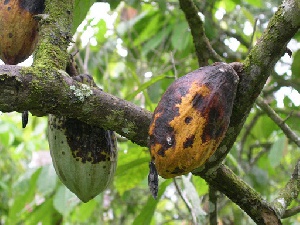The Government has begun cutting down disease infested and moribund cocoa trees in Sefwi Wiaso in the Western Region.
More that 11million disease infested cocoa trees will go down in the countrywide exercise being spearheaded by the Ghana Cocoa Board (COCOBOD).
Affected cocoa farmers, kasapafmonline.com understands, will earn GH?552.00 per hectare of their cocoa farm as compensation package.
Land owners or landlords who also gave out their lands to the affected cocoa farmers have also been penciled to get some compensation package. The amount is immediately not known.
The exercise is expected to continue in the Eastern Region moments after completing the task in Sefwi Wiaso and other communities that have been captured by the COCOBOD as Western North before moving to the remaining five cocoa producing regions.
The Executive Director, Cocoa Health & Extension Division of COCOBOD, Emmanuel Opoku in an interview with Radio Ghana, Wednesday, August 22, 2018, explained that Western North was chosen ahead of the other cocoa producing regions because it is the “bread-basket” of the cocoa industry in Ghana.
The region produces about 67% of the national volume of cocoa production while the Eastern Region also produces about 25% of the national volume of cocoa production.
“It means that Western North has been the region that produces the largest volume of cocoa in Ghana and the disease has actually affected production in this part of the country and that is why our starting point is Western North and Eastern Regions”, he noted.
Asked whether the exercise was not in any way going to affect the cocoa farmers as well as production, Mr. Opoku noted that the farmers have been well sensitized and are so eager for the exercise because “the disease has devastated their source of income overtime and has been waiting for this opportunity. In spite of this, we have also made available some funds to compensate the affected farmers and the land owners to avoid issues where the farmer, who is a tenant farmer, may lose the land because as soon as the trees are cut, then they are landless – that is the kind of tenure system we have in this country”.
He added “per hectare, we are paying GH?552.00. The amount is not small because the cocoa trees are not bearing anything at all. The affected plants are not bearing at all. A normal hectare of land on the average produces about eight bags of cocoa on the average. With the disease, the farmers are getting maximum two bags. Some are getting nothing at all because the farms are visibly bad”.
The exercise, according to Mr. Opoku, had been in existence prior to 2013 but was not on a large scale. The exercise, he added, came to a halt in 2013 with COCOBOD allowing the farmers to execute the task on their own.
Business News of Friday, 24 August 2018
Source: kasapafmonline.com

















